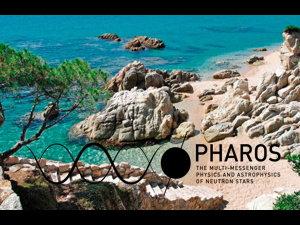Speaker
Mr
Thomas Carreau
(Université Caen-Normandie)
Description
The neutron star crustal EoS and transition point properties are computed within a unified meta-modeling approach.
The variational equations in the crust are solved within a Compressible Liquid Drop (CLD) approach, with surface parameters consistently optimized for each EoS set on experimental nuclear mass data.
When EoS parameters are taken from known Skyrme or RMF functionals, the transition point of those models is nicely reproduced.
A model-independent probability distribution of EoS parameters and of the transition density and pressure is determined with a Bayesian analysis, where the prior is given by an uncorrelated distribution of parameters within the present empirical uncertainties, and constraints are applied both from neutron star physics and ab-initio modelling. We show that the characteristics of the transition point are largely independent of the high density properties of the EoS, while ab-initio EoS calculations of neutron and symmetric matter are far more constraining.
Considering these constraints, a quantitative prediction of crustal properties with controlled confidence intervals and increased precision with respect to previous calculations ($\approx 9\%$ dispersion on the crustal width and $\approx 25\%$ dispersion on the fractional moment of inertia) can be reached.
The crustal moment of inertia is also evaluated as a function of the neutron star mass.
The possible crustal origin of Vela pulsar glitches is discussed within the present estimations of crustal entrainment, disfavoring a large entrainment phenomenon if the Vela mass is above $1.4M_\odot$.
Further refinement of the present predictions requires a better estimation of the high order isovector empirical parameters, e.g $K_{sym}$ and $Q_{sym}$, and a better control of the surface properties of extremely neutron rich nuclei.
Primary authors
Prof.
Francesca Gulminelli
(LPC/ENSICAEN)
Dr
Jérôme Margueron
(IPNL)
Mr
Thomas Carreau
(Université Caen-Normandie)

